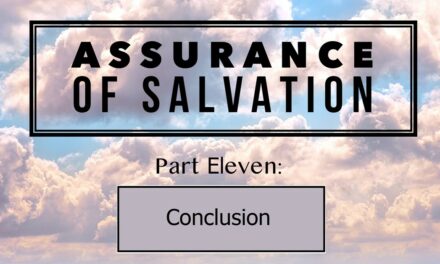A proper understanding of the moment of salvation and the movement of walking in the Spirit hinges on the distinction of purpose for each. Confusing the two purposes threatens to obscure free salvation in Christ while bringing a works or bondage salvation into focus.
It is vital not to confuse the do of walking in the Spirit with the receive of salvation. In the effort to counter easy-believism, some have added sanctification truth (emphasizing the walk of the changed life) to salvation. However, unregenerate man cannot understand the Christian life, for “the natural man receiveth not the things of the Spirit of God . . . because they are spiritually discerned” (1 Cor. 2:14). The natural man does not have the Holy Spirit. The only promise of the Spirit’s convincing work in the heart of an unsaved person is John 16:8: “He will reprove the world of sin, and of righteousness, and of judgment.” Therefore, our gospel articulation must focus on sin, righteousness, and judgment and not on the changed life (walk) of sanctification. Dealing with sanctification truth is not what the Holy Spirit uses to convince the world.
The lordship salvation position violates this reality, emphasizes the walk of sanctification for the moment of salvation, and improperly uses sanctification and service passages for the issue of salvation. Luke chapter 9 stresses the need to exchange the self-life for the Christ-life, and the second chapter of James highlights the need for faith steps in service to actually serve. These are critically important Christian walk passages, but introducing them with the issue of salvation is not correct.
The debate is not whether Jesus is Lord. The issue is what constitutes the condition of salvation. Lordship salvation confuses the condition for salvation with that for the Spirit-filled life. The Scriptures do teach “lordship sanctification,” commanding believers to yield to the lordship of Christ—surrendering to and depending on the Spirit of Christ as Lord and life for leadership and power. Simply put, this is the Spirit-filled life for holiness and service. But to include an emphasis on lifestyle changes with the moment of salvation is at best confusing and at worst false doctrine.
The solution to the problem of acknowledgment-only/easy-believism salvation decisions is to deal specifically with sin as that which offends God’s holiness, uncompromisingly with hell as the just judgment, and clearly with the finished work of Christ as the sole object of dependence for salvation. If sin and hell are dealt with thoroughly, then the sinner sees his need of a Savior, just as a sick man sees his need of a physician. This emphasis precludes the notion of giving someone a “quick ticket to heaven and license to sin” and does so without violating the true freeness of salvation. Then, once saved, the individual can and must be taught the Spirit-filled life in order to grow spiritually.
While salvation introduces significant positional and inward changes (e.g., a new spirit and the indwelling Spirit), practical outward change occurs as one accesses the Spirit of Christ by faith to live (walk) the Christian life. True change that pleases God comes as a believer walks by faith and thus walks in the Spirit. Any other change is self-change which cannot please God because it is not of faith. “But without faith it is impossible to please him” (Heb. 11:6). Flesh-dependence brings bondage, but God-dependence accesses life and liberty of the Spirit for the freedom of a true Christian walk.
Next week, we will conclude with a real-life example of how important it is to keep faith and repentance crystal clear.

John Van Gelderen
Post Author












Hey John, Thank you for making this issue of salvation vs. sanctification very clear. For a long time I struggled with understanding exactly what repentance was and how it relates to a person getting saved, since there are clear passages in the N.T. for those coming to Christ to repent. This series has been a real eye-opener for me. Now I understand the confusion it brings if when preaching the gospel to sinners, we tell them to “repent of their sins” and then try to explain what kind of “life change” this is supposed to be, but then on the… Read more »